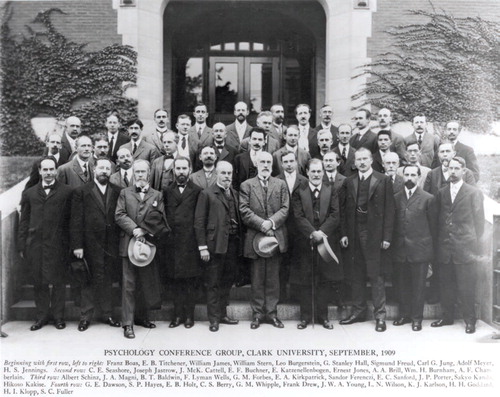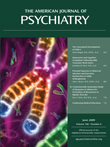Freud in the New World
Sigmund Freud visited the United States only once in his lifetime. The trip, up the eastern seaboard from New York to Boston and then to Niagara Falls, was organized around an invitation to lecture in Worcester, Mass., at Clark University , in honor of its 20th anniversary. The conference was held 100 years ago, in September 1909, and was hosted by Granville Stanley Hall, a pioneer American educator and psychologist. Twenty-eight other speakers were invited to Clark, representing basic sciences, history, psychology, anthropology, and pedagogy; this venerable group included two Nobel laureates, physicists A.A. Michelson and Ernest Rutherford. Hall had focused a spotlight on psychoanalysis by inviting Freud and his colleague Carl Jung to present their work before contemporary leaders of the behavioral sciences, including Adolf Meyer, James Jackson Putnam, William Stern, E.B. Titchener, and William James (1) .

In a letter dated Dec. 15, 1908, Hall first invited Freud to speak at part one of the conference, which was focused on education, to be held in July of 1909. “We believe that a concise statement of your own results and point of view would now be exceedingly opportune, and perhaps in some sense mark an epoch in the history of these studies in this country” ( 1 , p. 339). Freud declined this invitation, citing ambivalence about taking time off in July, during the height of his private practice, as well as other concerns. In a letter to Jung he wrote, “I also think that once they discover the sexual core of our psychological theories they will drop us. Their prudery and their material dependence on the public are too great. That is why I have no desire to risk the trip in July” ( 2 , p. 196). Freud finally accepted Hall’s second invitation to lecture in September, which was couched in the promise of a doubled stipend and an honorary degree. Along with their friend Budapest analyst Sándor Ferenczi, Jung and Freud made the journey on the ship George Washington. The trip provided ample time for the Züricher and his Viennese mentor to analyze each other’s dreams, as well as further develop a relationship fraught with tension and competition.
Freud’s lectures covered his most fundamental concepts. His most controversial discussion concerned the development of sexuality, beginning in infancy. Freud spoke extemporaneously after organizing his thoughts during walks with Ferenczi each morning (3) . According to one scholar, the published lectures are not identical with those presented at the conference, because Freud altered the order so that William James would hear about free association and the theory of dreams rather than sexuality ( 1 , p. 125). James received Freud’s lecture with a blend of support and skepticism: “They [the Freudians] cannot fail to throw light on human nature, but I confess that he made on me personally the impression of a man obsessed with fixed ideas” ( 4 , p. 224).
Even with the mixed reviews, Freud experienced his American reception as far more positive than he had expected, and he was impressed by both the knowledge and openness of his New World colleagues: “In prudish America it was possible, in academic circles at least, to discuss freely and scientifically everything that in ordinary life is regarded as objectionable” ( 5 , p. 31). The Clark lectures, and Freud’s reception in America, provided him with the feeling that he had arrived: “In Europe I felt as though I were despised; but over there I found myself received by the foremost men as an equal. As I stepped onto the platform at Worcester to deliver my Five Lectures on Psycho-Analysis it seemed like the realization of some incredible day-dream: psychoanalysis was no longer a product of delusion, it had become a valuable part of reality” ( 6 , p. 52).
1. Rosenzweig S: Freud, Jung, and Hall the King-Maker: The Historic Expedition to America (1909). St Louis, Rana House, 1992Google Scholar
2. McGuire W (ed): The Freud/Jung Letters: The Correspondence Between Sigmund Freud and CG Jung. Princeton, NJ, Princeton University Press, 1974Google Scholar
3. Freud S: Sándor Ferenczi (1933), in Complete Psychological Works, standard ed, vol 22. London, Hogarth Press, 1964, pp 225–230Google Scholar
4. LeClair RC (ed): The Letters of William James and Théodore Flournoy. Madison, Wisconsin, University of Wisconsin Press, 1966Google Scholar
5. Freud S: On the history of the psycho-analytic movement (1914), in Complete Psychological Works, standard ed, vol 14. London, Hogarth Press, 1957, pp 7–66Google Scholar
6. Freud S: An autobiographical study (1925), in Complete Psychological Works, standard ed, vol 20. London, Hogarth Press, 1959, pp 7–70Google Scholar



